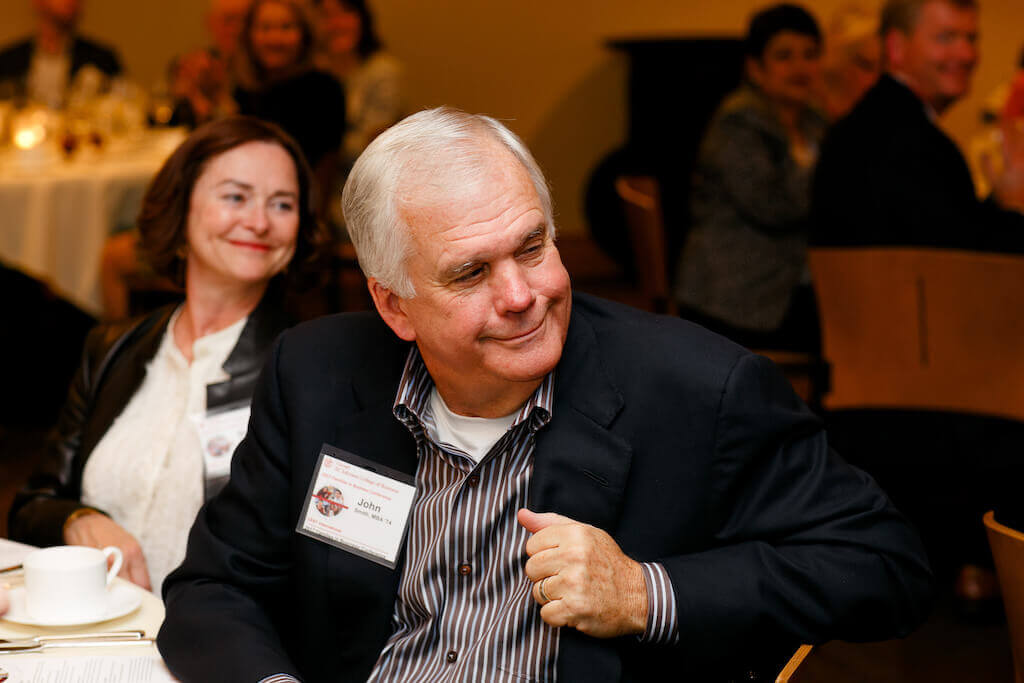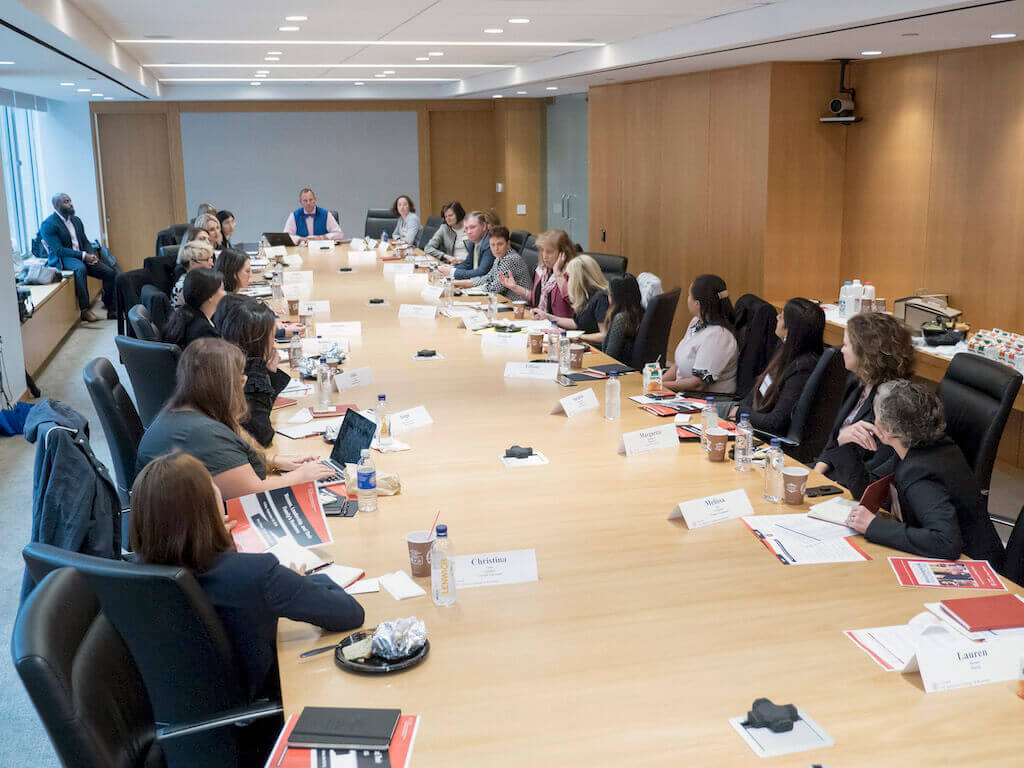Despite forming the backbone of the global economy, family businesses still have limited choices tailored to their specific needs and challenges in the education space. Family businesses not only demand the same operating acumen of other organisations, but they can also face tests of multigenerational leadership and isolation in a vast corporate landscape. A university programme that offers a supportive mix of instruction, engagement and mentorship can mean all the difference for these businesses and the families that run them – as can the exposure to peers sharing the same entrepreneurial experience.
Launched through a generous endowment from John and Dyan Smith in 2014, the Smith Family Business Initiative at Cornell provides family business students, owners and their successors the practical knowledge, education and networking support integral to their unique needs.
Tharawat Magazine had the opportunity to sit down with Dann Van Der Vliet, the Executive Director of the Smith Family Business Initiative at Cornell, to discuss how the programme was created to serve and support students and family business owners from around the world.
What brought you to the field of family business?
I did not set out for a career in family business, or even “business” for that matter. My passions originally revolved around the environment and natural resources. That’s what I studied when I was at the University of Vermont.
When I realised I wanted to go back to the university to pursue my graduate degree, I entered through its continuing education programme, typically attended by adult and non-traditional learners. It was in that capacity that I began working with business owners around their workforce needs and built up a network in Vermont. Being a relatively small state, I was able to grow a strong network and develop a fortuitous connection to the dean of the business school at the time, Rocki-Lee DeWitt.
The university had a family business programme at that time, albeit very small. When the director of that programme left in 2002, they approached me because of my considerable network and experience with running programmes. Up to that point, I had no real knowledge of family business. What appealed to me was how the strong network that exists in higher education made it possible to connect with business thought leaders. Besides, the position had more to do with empathy – understanding the individual and their situation and being able to connect them with the necessary resources or people.
Over the course of the next 10 to 12 years, I learned on the job and helped to grow that programme into a respected regional centre. In 2012, Prof Pramodita Sharma joined the University. Dita helped us to begin working more with the student population at the university, and we created the family enterprise case competition and ran a few summer institutes. By the time Cornell received a gift from John and Dyan Smith to launch the Smith Family Business Initiative, I had developed great knowledge of family businesses and built my own personal network across the globe. At that point, my experience had positioned me well for a move to Cornell.

John and Dyan Smith are the driving spirit behind the endowment of the Smith Family Business Initiative at Cornell. Can you tell us more about what inspired them to create it?
Theirs is a great family business story. The company, Cedar Rapids Steel Transport, was started by John’s father, “Smitty” with a refurbished chicken coop they purchased for $125. They were early innovators in the way they held and transported freight, which helped pave the way to their success. John took over the company after completing his MBA at Cornell and eventually bought out his two siblings.
When his three children began to come of age, there was a realisation that they weren’t interested in running a traditional trucking and transportation company. That made John think about transitioning a second-generation business to a third-generation and how to go from family- managed to family-owned. Through that thought process, John began to wonder why family-geared business programmes are so rare and how Cornell could help with all of its resources. Ultimately, the endowment was the result.
How did you start building the Initiative, create awareness and bring it to where it is today?
Many family business programmes, particularly in the US, overlook the fact that they’re part of the university and its core mission of educating students and engaging alumni by proxy. That was where we started. We built from the ground up a programme that served the needs of students, many of whom come from India, the Middle East, Latin America and Asia. We promoted them and their interests as family business people across the university, which created a dynamic network that many other schools did not have. It encouraged alumni to get engaged, and we discovered many well-placed family businesses in the Cornell ecosystem, such as Peter Coors and Coors Brewing, as well as Harney and Sons Tea.
Building that awareness at the university and alumni level was a critical first step. Today, out of approximately 240 MBA students we receive every year, about 70 come from a family business. Many of them indicate that they chose Cornell because of the Smith Family Business Initiative. By embracing the Initiative, Cornell has created an opportunity to identify as one of the leading schools for family business.

[ms-protect-content id=”4069,4129″]
Can you tell us a little more about the types of programmes you offer? How much is research and how much is outreach to the wider family business ecosystem?
I’m a subscriber of a holistic model supported by three major pillars: outreach, in-reach (which is service to students and others on campus) and a research component. With in-reach, we have a speaker series that gives us an opportunity to engage with alumni or family business leaders. We organise an entire day on campus around a speaker’s visit and typically have 40 or 50 students in attendance. It’s a wonderfully diverse mix of first-generation all the way up to seventh-generation family business students, from all over the world and every type of industry. I think that’s typical of a family business audience; it cuts across industry and culture. We also have a peer group event we call “Family Business Fridays”. Every Friday, students get together, have lunch, engage with their peers and sometimes bring some of their family business issues forward. We are also exploring putting together a case competition that would utilise our campus in New York City as a venue for the programme. These are some of the activities that students have the opportunity to lead and get engaged in.
Our outreach is where we put much of our executive education and external programming. We have a three-day conference in Ithaca which offers a mix of master classes, keynotes and breakout sessions. We have our “Mentors Forum”, a day-long programme where alumni and family business leaders can meet one-on-one with students in 30-minute mentoring and coaching sessions. Last spring, we had our first Family Innovations Summit in New York City; it brought together about 70 business leaders from family businesses. We have a series of family business roundtables that gives us an opportunity to dive deep into a specific area of interest, such as conflicts or women’s leadership in family businesses. We also have a more traditional executive education programme. A few weeks ago, we hosted a four-day programme in Miami for Latin American family businesses with around 40 business leaders in attendance. We’ve also organised a global emerging leaders programme targeted at the next-gen, but there’s a lot more we can do.
The final pillar is the research. We’ve brought in Margarita Tsoutsoura as our Academic Director at the Smith Family Business Initiative. She’s actively building up our research capacity, both with her own work and by bringing in other scholars. Daniela Scur, who just finished her PhD at Oxford, will be joining in the Dyson School in 2019 to increase the amount of research we’re contributing to this space.
The process from inception to realisation over the last four years must have been very educational. What are your primary goals at the Initiative now?
I sit in the Johnson School, the graduate school at Cornell. We have recently created the SC Johnson College ofBusiness, which has unified the graduate school of business, the undergraduate school of business (Dyson) and the Cornell Hotel School. We have also taken a big step and appointed a new assistant director, Erin Kelly, who will interconnect with the students in those programmes at Cornell, beyond the Johnson school. If we can start building an audience in the undergraduate population in areas like hotel management, agriculture, law and engineering, I am certain we will be considered a premier destination for any student globally who is considering family business in some capacity.
It’s been encouraging to see students from the HR and consulting space attending our classes, not because of a specific family business, but with an understanding that there are distinct issues in the area of family business that they are likely to confront in their chosen career path. That’s where I would like to see the initiative grow from a curricular perspective in the next five to ten years.
Finally, I would like to increase the programme’s global exposure. I think there’s a great demand to explore some of our alumni and contacts in places like China, India and Latin America. As we continue to grow, there might be opportunities to do more work in those parts of the world. My goal from day one has always been to create the best family business programme in the world, and I want Cornell to be top-of-mind for anyone interested in family business. I believe we’re moving in that direction.
[/ms-protect-content]














